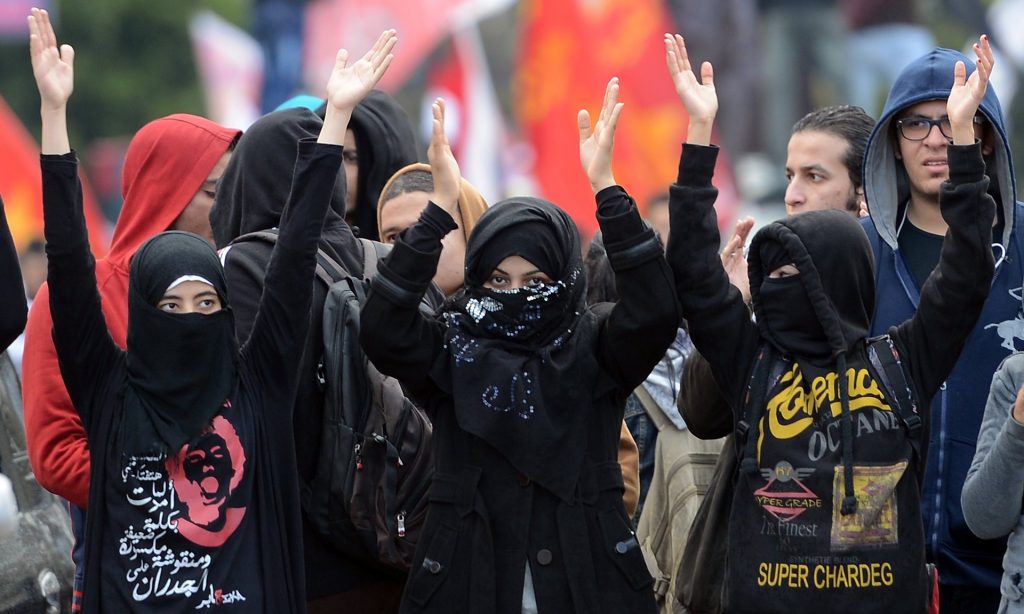In the heady days of the 2011 uprising, it seemed as if Egypt’s youth, mobilising on social media and marching on Tahrir Square, had finally come into their own. When President Mubarak stepped down, I turned to my seventysomething Egyptian father, who had been on the barricades of the 1952 revolution, for words of wisdom on the future of the country.
“The army will be back in power within a year,” my father said. “But Dad, look at democracy in action, look at what the young people have achieved,” I protested, pompously quoting Wordsworth on the bliss of being alive and the very heaven of being young in such revolutionary times. “What about them?” “Ah, yes,” my father replied, without missing a beat. “They’ll be in prison.”
Now my father is a surgeon, not a soothsayer, but he understood what I and so many other observers failed to fully grasp: the essential Egyptian craving for stability at almost any cost. How is it that a people who fought to overthrow dictatorship now support an even more iron hand? How did young Egyptians go from activism to apathy so fast? And how does a new generation reconcile temptation with salvation? These are among the many questions that Rachel Aspden’s Generation Revolution explores through the intimate stories of a dozen or so urban Egyptians before, during and after the tumult of 2011. The Arab spring has yielded a bumper crop of books about youth across the region, and Generation Revolution is among its more fruitful reads.
Having lived on and off in Cairo for more than a decade, Aspden has a clear eye for its marvellous and maddening details, from the kindness of strangers to its ever ready conspiracy theories. She also does a good job of painting the big picture, be it the gap between appearance and reality and the crushing pressure to conform that characterises so much of Egyptian life, or the twists and turns of domestic politics over the past few decades. Although Aspden’s narrative style is at times puzzling, blurring the line between what she saw and what she was told, her stories are always compelling.
While many similar books have focused on women, Generation Revolution is particularly interesting for its nuanced portraits of young Egyptian men. We see the rigours of the marriage market through the eyes of Abdel Rahman, a photographer from Upper Egypt, and his growing disillusion with the “Camp David negotiations” over money that accompany many a marriage proposal. Amr, a software engineer from Alexandria, struggles with that quintessential masculine rite of passage, military service, and the pressures to istirgal or “man up”, which underpin the patriarchy, from the father of the family to the father of the nation.
With the fall of the Muslim Brotherhood and the rise of Isis-affiliated violence, there is a tendency, particularly within Egypt, to homogenise and demonise all shades of Islamism. Generation Revolution is a welcome prism, separating the spectrum of political Islam through the coming of age of its characters. Sixteen-year-old Ayman, for instance, embraces Salafism, whose fierce austerity at first gives meaning to a world awash in consumerism and corruption, but which eventually leaves him high and dry.
His friend Mazen gravitates towards a more moderate, media-savvy form of Islamic revival, but one which ultimately disappoints him as well. Ruqayah and Sara, on the other hand, remain defiant, trenchantly maintaining their allegiance to the Muslim Brotherhood through detention, death and destruction. The faith of these young men and women takes different forms, but as Aspden discovers to her surprise, “for them, religion was far from a restriction or burden – it was a means of liberation”.
While Aspden gamely looks for glimmers of hope in the promise of 2011, Egypt’s foreseeable future is far from rosy. Amr, on his way to a new life overseas like so many of the book’s leading lights, sums it up: “Infrastructure, electricity, economy, terrorism, repression, corruption, mob rape, population explosion, the list goes on. This ship is sinking and I have to jump.” Generation Revolution is the story of a wheel come full circle, and a sobering tale for anyone with an interest in Egypt’s future.
Generation Revolution is published by Harvill Secker (£16.99). Click here to order it for £12.99

